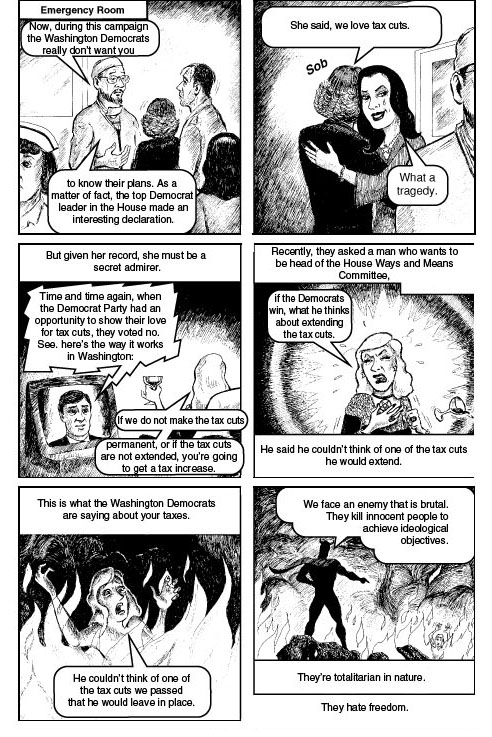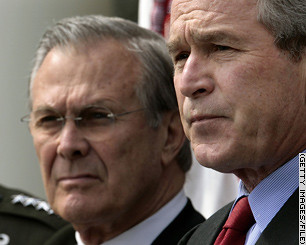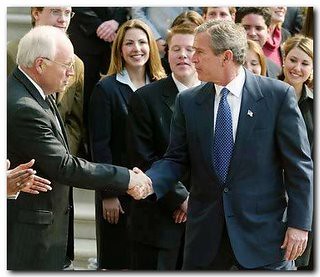Okay, so it's long been argued that the terr'ists hate us for our freedoms. Unwilling to see his people in danger, our brave and steadfast president has wisely taken steps to protect us by
officially signing away those freedoms. On Tuesday, Bush proudly signed into law the Military Commissions bill, also known as the Won't Someone Save Us From Our Own Freedoms Act of 2006.
Now, as anyone knows who knows me and/or reads my blog and/or happened to be in Southside Birmingham on the evening of Thursday, September 28,
this bill makes me sad. It makes me sad for a lot of reasons, but the most sad-making reasons have to be the revocation of habeas corpus and the president's shiny new power to declare anyone, even an American citizen, an enemy combatant, and thus deny them any protection whatsoever under the Geneva Conventions.
Following that Friday's post, I received an e-mail from a person I know who will remain nameless because he's involved in both law and government, and he's a good person and doesn't deserve to have his good name dragged into this. Regardless, the e-mail said, "You seem to be interested in the issue of 'unlawful combatants' and related matters" and was accompanied by an article from the Virginia Journal of International Law on, shazzam, "Unlawful Combatants and the Geneva Conventions."
Before I actually get into the issue of "unlawful combatants" themselves, I wanted to throw out a little primer on the
Geneva Conventions. Allow me to remind you - I'm just a caveman. Your world frightens and confuses me. But I've interpreted the Conventions as best as my lacking-a-law-degree mind can, and I welcome correction by thems that have studied these things.
The Geneva Conventions consist of four Conventions, signed in 1949, and two Protocols, signed in 1977. Under the Supremacy Clause (Article VI, paragraph 2) of the United States Constitution, the US is required to adhere to any international treaties to which it is a party, so any argument that "it's not US law, so the president doesn't have to follow it" is bunk. The debate here is not whether or not the US has to follow the Conventions, but whether or not the people who've been declared "enemy combatants," the ones we've got detained and the ones the president can detain with his new powers, are protected by the Conventions. My argument is that they are.
Convention I addresses "the Amelioration of the Condition of the Wounded and Sick in Armed Forces in the Field," laying down protections for those who are, well, wounded. Or sick. In the field.
Convention II extends similar protections to wounded and sick members of naval forces.
Convention III, one of the most debated and most cited of the conventions in our current debate, addresses designation and treatment of Prisoners of War, and
Convention IV addresses the treatment of civilians (Protocols
I and
II deal with victims of international armed and un-armed conflict, respectively, and won't really come into this argument).
Article 4 of Convention III outlines six categories that qualify for prisoner-of-war status:
(1) Members of the armed forces of a Party to the conflict, as well as members of militias or volunteer corps forming part of such armed forces.
(2) Members of other militias and members of other volunteer corps, including those of organized resistance movements, belonging to a Party to the conflict and operating in or outside their own territory, even if this territory is occupied, provided that such militias or volunteer corps, including such organized resistance movements, fulfil the following conditions: (a) that of being commanded by a person responsible for his subordinates; (b) that of having a fixed distinctive sign recognizable at a distance; (c) that of carrying arms openly; (d) that of conducting their operations in accordance with the laws and customs of war.
(3) Members of regular armed forces who profess allegiance to a government or an authority not recognized by the Detaining Power.
(4) Persons who accompany the armed forces without actually being members thereof, such as civilian members of military aircraft crews, war correspondents, supply contractors, members of labour units or of services responsible for the welfare of the armed forces[...].
(5) Members of crews [...] of the merchant marine and the crews of civil aircraft of the Parties to the conflict.
(6) Inhabitants of a non-occupied territory, who on the approach of the enemy spontaneously take up arms to resist the invading forces, without having had time to form themselves into regular armed units, provided they carry arms openly and respect the laws and customs of war.
That bolded passage lays out the four requirements for militia members and volunteers to be granted prisoner-of-war status; those four requirements explain why insurgents hiding in alleys and attacking US troops wouldn't qualify.
The debate comes when we ask what the insurgents
are, if they're not prisoners of war. And, moreover, what about the numerous detainees who have been picked up not for attacking Coalition interests, but just for (allegedly) knowing something or knowing someone who knows something? President Bush has identified them all as "unlawful enemy combatants," a status that doesn't even exist in the text of the Conventions, and denied that any protections apply. Do they
really not qualify for
any protection whatsoever?
I'll admit that at first, my objection to the concept of "unlawful enemy combatants" was fairly basic and reliant on logic: Why would the drafters of the Geneva Conventions go to all of this trouble to define various classes of detainees, and then outline specifically what could and could not be done to the different classes, if they intended to leave a loophole that would leave one discrete group to be tortured at will? If they're concerned about the treatment of captured uniformed soldiers, and they're concerned about the welfare of civilians, clergy, the injured, and even spies and saboteurs, why leave a small, specific group of people out to swing?
Unfortunately, I'm still unsatisfied as to the "why" or even the most basic "whether". While the nonbinding ICRC Commentary accompanying the Conventions seems to follow my reasoning, the Final Record of the Conventions tends to contradict it, and references to the little-mentioned Stockholm Convention would appear to support the Final Record. While we don't know for sure whether some unlawful combatants
must be excluded, we can determine that delegates were divided over whether or not they
would be excluded, so the idea that they
might be excluded does hold. Jason Callen, author of the VJIL article in question, interprets this as "strong evidence" that such combatants must be excluded. I reject his interpretation.
The big question comes up in Convention IV, the Civilian Convention. Most previous conflicts to which the US has been a party have involved uniformed armies and tanks and people with flags on their uniforms that tell you what country they're from. In the past, it's been easy to identify those protected under the Convention IV as "pretty much everyone I didn't just mention in the last sentence." The conflict in Iraq is different, though. Once Saddam Hussein's own army was dissolved, parties to the conflict fell into the categories of "uniformed Coalition forces" and "pissed-off guys hiding in alleys with IEDs." Furthermore, a guy who was happily living as an actual civilian one minute could very easily pick up a gun and become a combatant the next; all it takes is the wrong bullet hitting the wrong child.
Article 4 of Convention IV begins as follows:
Persons protected by the Convention are those who, at a given moment and in any manner whatsoever, find themselves, in case of a conflict or occupation, in the hands of a Party to the conflict or Occupying Power of which they are not nationals.
Good start; kind of broad, though. Let's keep reading. Article 5 of that Convention says:
Where in the territory of a Party to the conflict, the latter is satisfied that an individual protected person is definitely suspected of or engaged in activities hostile to the security of the State, such individual person shall not be entitled to claim such rights and privileges under the present Convention as would, if exercised in the favour of such individual person, be prejudicial to the security of such State.
Where in occupied territory an individual protected person is detained as a spy or saboteur, or as a person under definite suspicion of activity hostile to the security of the Occupying Power, such person shall, in those cases where absolute military security so requires, be regarded as having forfeited rights of communication under the present Convention.
So, if the detainee is suspected of activities that would put the US in danger, the US isn't required to extend rights to them that would further endanger the US. Sounds fair; I mean, I don't want the US guaranteeing communications rights to some terr'ist who's just going to send a message to his friends, right? But
exactly what rights are
likely to further endanger the US? I mean, what can the US do to a detained terrorist in the interest of national security?
In each case, such persons shall nevertheless be treated with humanity and, in case of trial, shall not be deprived of the rights of fair and regular trial prescribed by the present Convention. They shall also be granted the full rights and privileges of a protected person under the present Convention at the earliest date consistent with the security of the State or Occupying Power, as the case may be.
Oh. Okay.
Part III of Convention IV goes on to outline provisions of civilian detainees: respect for their honor/families/religions, protections against rape or forced prostitution, protection against murder/torture/scientific experimentation/other brutality, protection from collective punishment, and provision for anyone from outside the territory to the conflict to be allowed to return there (unless it's contrary to the security interests of the detaining state). All good things.
But it still doesn't determine whether
our detainees qualify for those protecions under the Civilian Convention, since they aren't
lawful combatants, but they're not uninterested parties, either.
The Military Commissions bill defines an "unlawful enemy combatant" as
a person who has engaged in hostilities or who has purposefully and materially supported hostilities against the United States or its co-belligerents who is not a lawful enemy combatant (including a person who is part of the Taliban, al Qaeda, or associated forces)
(or whoever the president or secretary of defense say is one), and Callen, in his article, makes a distinction between two types: regular unlawful combatants, such as spies and saboteurs who operate behind enemy lines and who do receive protection under the Civilian Convention, and "battlefield" unlawful combatants, who fight directly on the battlefield but don't meet those conditions to be considered prisoners of war and can, arguably, receive no protection at all.
Quick recap: As far as detainees go, we've determined that:
-
any qualifying uniformed members of a regular army or militia receive full Geneva protections as prisoners of war, that
-
any civilians picked up for any reason (say, the taxi driver who knows someone who knows someone but hasn't taken an active part in the hostilties) receive full Geneva protections as civilians, and that
-
certain "enemy combatants," specifically those who work in occupied territory and don't venture out onto the battlefield, are afforded limited Geneva protections as civilians and must be treated humanely, be given a fair trial, and have full protections restored as soon as they are no longer a threat to the US.
And we've yet to determine:
- if any of the US's detainees would qualify as "battlefield enemy combatants" and thus be exempt from any kind of protection under the Geneva Conventions.
Moving on.
What about "battlefield unlawful combatants"? What are they, anyway? For that matter, what's the battlefield? At present, there is no real "front line" in the Iraq war. Fighting is taking place in the streets and the marketplaces, pretty much anywhere insurgents are able to attack each other and/or Coalition troops. Does that mean that the entire country is a battlefield? Or does it mean that the entire country is "the territory of a Party to the conflict"? If it's the former, then it could be argued that
nobody captured in Iraq would be afforded any protection under the Civilian Convention.
But I think that President Bush feels differently. In May of 2003, Bush climbed into a flight suit and declared that
"major combat operations in Iraq have ended." He had a great big "Mission Accomplished" banner and everything. At that point, Iraq became occupied territory. Where do you find a "battlefield" unlawful combatant in a country without battlefields? His aircraft carrier photo op was enough to afford protection under the Civilian Convention to the very detainees he argued weren't subject to the Geneva Conventions.
I'll accept Callen's argument that the Geneva Conventions were written to exclude certain groups. I don't like it, but he made his case, so never let it be said that I can't be convinced. I'll even accept the reasoning behind it: When combatants disguise themselves as civilians, both civilians and uniformed troops are put at risk.
However, I don't accept the argument that detainees in Iraq and at Guantanamo Bay don't receive protection under the Geneva Convention. Some of them are civilians, flat-out. Some of them are unlawful combatants aiding terrorists and insurgents behind the scenes. Some of them are unlawful combatants acting as spies, saboteurs, and worse in "territory of a Party to the conflict." But as bad as many of these guys are, the circumstances of their capture affords them some protection under the Geneva Conventions, even if it's just minimal: protection against torture. Protection against being shot out of hand. Protection against the use of force or coercion to obtain information. Protection from extraordinary rendition. Right to a fair trial.
Humane, legal treatment.
Just because President Bush writes himself a little loophole declaring that "unlawful combatants" aren't subject to the Geneva Conventions don't make it so. I could declare unilaterally that I'm engaged to Michael Bublé and we're going to produce two gorgeous, musically talented little babies, but that doesn't make it the case. The reality is that no matter how angry we are at what these detainees are allegedly doing to our country, we have to treat them
humanely and
legally. Because back in 1949, we promised. And none of Bush's compromise bills, executive orders, or signing statements can undo that promise.


















